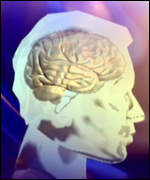| Alan Turing: Father Of The Computer |

Alan Turing is credited with inventing
modern computer science
You may never have heard of him, but it is largely thanks to his genius that you are reading this on your computer.
Alan Turing, a pioneering 20th century mathematician, is widely considered to be the father of modern computer science.
It was his idea of creating a machine to turn thought processes into numbers which was one of the key turning points in the history of electronic boxes and screens.
Now an appeal has been launched to raise £50,000 for a bronze statue of him - but so far, computer companies have failed to give a single penny.
Turing was born in London in 1912 into an upper-middle class family and displayed a fascination for science throughout childhood.
A tape machine
While reading maths at King's College, Cambridge, in the 1930s, Turing spent much time reworking earlier scientific principles and developing his most significant mathematical theories.
Despite his brilliance, he suffered from a feeling of isolation, and found it difficult to make friends.
After graduating, Turing was elected a fellow of Kings, and worked at Princeton in the US, where he began work on what was later to become the first digital computer programme - the "Turing Machine".
His revolutionary idea was for a machine that would read a series of ones and zeros from a tape. These described the steps needed to solve a problem or task.
But it was not until nine years later that technology had advanced sufficiently to transfer these ideas into engineering.
Cracking the code
Turing's experiments are credited with helping Britain win World War II by deciphering encrypted German communications, helping the Allies remain one step ahead.
The wartime German computer Enigma generated a constantly changing code which was impossible for people to decipher. But Turing's creation of Colossus - one of the first steps toward a digital computer - managed to crack Enigma's codes, giving the Allies the break they desperately needed in fighting Germany.
After WWII, Turing took up long-distance running to relieve the stress and obtained record times in races in the Walton Athletic Club.
He went to work for the National Physical Laboratory and continued research into digital computers including developing the Automatic Computing Engine.
Intelligence without life
His research overlapped with philosophy, raising questions about the relationship between computers and nature. He wrote a paper called Intelligent Machinery which was later published in 1969. This was one of the first times the concept of artificial intelligence was raised.
Turing believed that machines could be created that would mimic the processes of the human brain. He acknowledged the difficulty people would have accepting a machine to rival their own intelligence, a problem that still plagues artificial intelligence today.

Turing believed his invention
was like the human brain
He likened new technology devices such as cameras and microphones to parts of the human body and his views often landed him in heated debates with other scientists.
Turing believed an intelligent machine could be created by following the blueprints of the human brain. He wrote a paper in 1950 describing what is now known as the Turing Test.
The test consisted of a person asking questions via keyboard to both a person and an intelligent machine. He believed that if computer's answers could not be distinguished from those of the person after a reasonable amount of time, the machine was somewhat intelligent. This test has become a standard measure of the artificial intelligence community.
Rebel with a cause
Turing was accustomed to being a non-conformist. At boarding school, he refused to adapt and ignored subjects that did not interest him. He was an atheist, and felt marginalised because of his homosexuality.
Turing's life came to a sad end when he committed suicide by taking potassium cyanide in June 1954.
The official explanation was that it was a "moment of mental imbalance". But his mother said he used to experiment with household chemicals, trying to create new substances and became careless. Others claimed he was embarrassed about his sexuality.
When he died, Turing left the world a permanent legacy. Computers have revolutionised so many aspects of our world that today it is hard to imagine life without them.
|